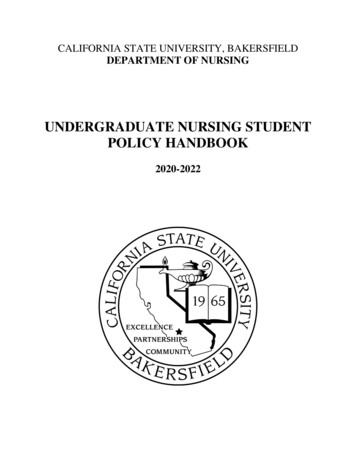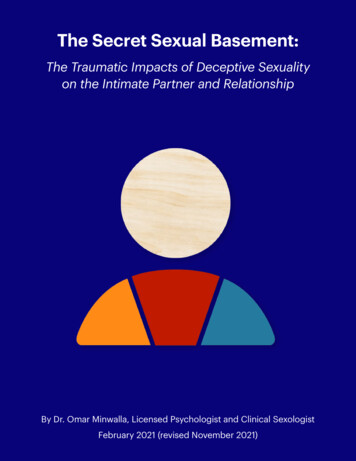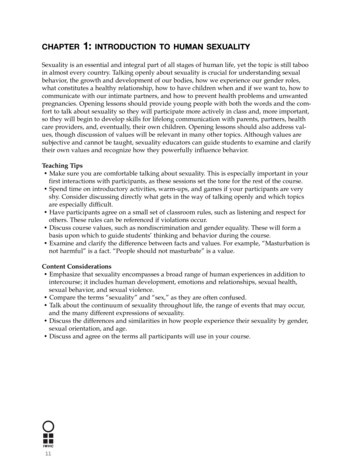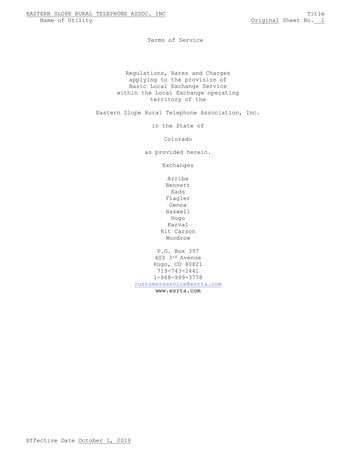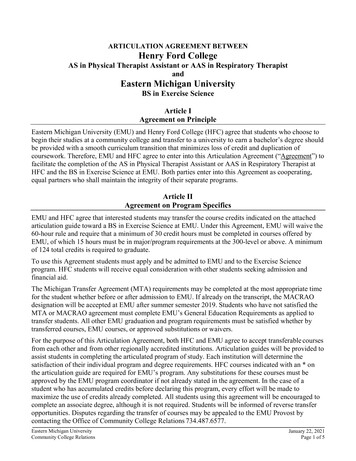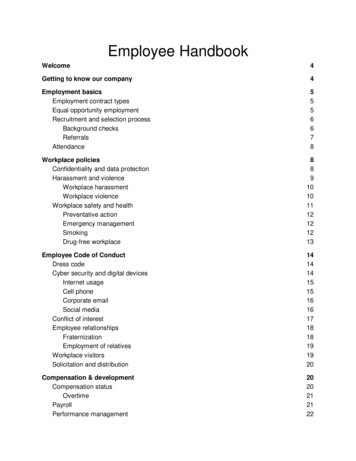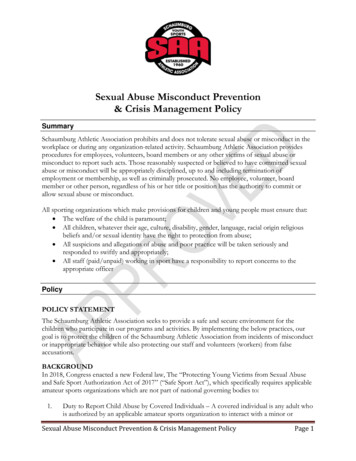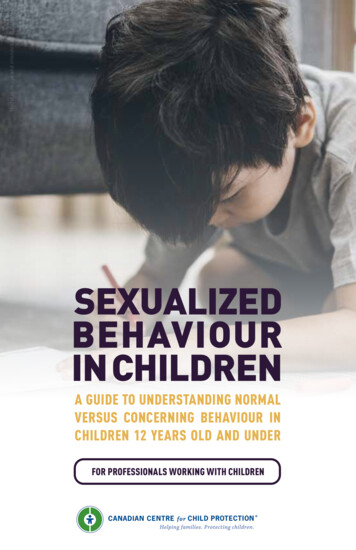
Transcription
UNITED STATES DEPARTMENT OF EDUCATIONOFFICE FOR CIVIL RIGHTSCLEVELAND OFFICE600 SUPERIOR AVENUE EAST, SUITE 750CLEVELAND, OHIO 44114-2611NOV 22 2010. Gloria A. Hage, Esq.General CounselEastern Michigan UniversityII Welch HallYpsilanti, Michigan 48197Re: OCR Docket #1 5-09-6002Dear Ms. Hage:I am pleased to canfinn the resolution of the proactive compliance review of EaslemMichigan University (the University) that the U.S. Department of Education (theDepartment), Office for Civil Rights (OCR), initiated on December 22, 2008. Thereview was conducted under Title IX of the Education Amendments of 1972. asamended, 20 U.S.C. § 1681 et seq., and its implementing regulation at 34 C.F. R. Part106. Title IX prohibits discrimination on the basis of sex in education programs andactivities operated by recipients of Federal financial assistance. As a recipient of Federalfinancial assistance from the Department, the University is subject to the provisions ofTitle lX.BackgroundThe University is a comprehensive, co-educational publ ic university located in Ypsilanti,Michigan. The University also has sites in Livonia, Jackson, Traverse City, FJint,Detroit, and Monroe, Michigan. The University offers ove.r 200 majors and minors infive colleges: Arts & Sciences, Business, Education, Health & Human Services,Technology. The University also has a Graduate School. The University serves nearly23,000 students, including 17,000 undergraduates and 5,000 graduate students. Sixtypercent of the University's undergraduate students are women.111C Dcpanma\t of r:ducalion 's m i\5;OO is 10 prorl)(lIt srulknt achin 'cmem and pTtpllmion for Ilella! wmpctith mess !ro'(OSten", cdllUlional c: ctl1ence. and murin, eqUlt IICU.'SS,.1
Page 2 - Ms. Gloria Hage, Esq.Key to OCR' s initiation of this review were reports that in 2006, a female studentattending the University was found dead in her donn room after being sexually assaulted.According to media reports, a fellow student sneaked into the victim' 5 dorm room, rapedher, and smothered her with a pillow. As a result of this incident, in 2008, the Universilyreceived a significant fi ne for violating the Jeanne Clery Disclosure of Campus SecurityPolicy and Campus Crime Statistics Act (the Clory Act), 20 U.S.C. § 1092f, a lawenforced by the U.S. Department of Education that requires colleges and universities totrack certain crimes, including sexual offenses, reported on and around campus and toissue an annual security report to students and employees providing area crime statisticsas well as security policies and procedures. The Department found that the Universityfailed to issue a warning about the homicide to students in accordance with the Clery Act,nor did it have a policy in place to do so. Instead, the University issued a statement thatno foul play was suspected in the student's deatll.Applicable Regulatory and Policy StandardsThe Title IX implementing regulation, at 34 C.F.R. § 106.31 (a), provides that no personshaU, on the basis of sex, be excluded from participation in, be denied the benefits of, orbe subjected to discrimination under any academic, extracurricular, research,occupational training, or other education program or activity operated by a recipientwhich receives Federal Financial assistance. Specific obligations are set forth at,34 C.F.R. § l06.31(b), including a recipient's obligation to ensure that its students arc notdenied or limited in their ability to participate in or benefit from the recipient's programsor activities on the basis of sex.Sexual harassment is a form of sex discrimination prohibited by Title IX. Sexualharassment is unwelcome conduct of a sexual nature. Sexual harassment can includeunwelcome sexual advances, requests for sexual favors, and other verbal, nonverbal, orphysical conduct of a sexual nature, such as sexual assault or acts of sexual violence.Sexual harassment of a student can deny or limit, on the basis of sex, the student's abilityto participate in or to receive benefits, services, or opportunities in the school's program.In addition to the nondiscrimination provisions, Title lX's implementing regulation alsocontains a requirement that recipients establish procedural requirements that areimportant for the prevention or correction of sex discrimination, including sexualharassment. These requirements include issuance of a policy against sex discriminationand adoption and pUblication of grievance procedures providing for the prompt andequitable resolution of complaints of sex discrimination. The regulation also requiresthat recipients designate at least one employee to coordinate compliance with theregulation, including coordination of investigations of complaints allegingnoncompliance. To comply with these regulatory requirements, recipients need torecognize and respond to sexual harassment of students by teachers and other employees,by other students, and by thlrd parties. IIU.S. Dcpanment of Education, Office for Civil Rights, Revised SexuaJ Haras5ment Guidance (200 I).
Page 3 - Ms. Gloria Hage, Esq."Ibe Title IX regulation, at 34 C.F.R. § 106.8(a), specifically requires that each recipientof Federal financial assistance designate at lea";t one employee to coordinate itsresponsibilities to comply with and carry out its responsibilities under Title IX. Therecipient is further required to notify all students and employees of the name (or title),office address, and telephone number of the designated employee or employees.Additionally, the Title IX regulation, at 34 C.F.R. § I06.8(b), requires recipients to adoptand publish grievance procedures providing for the prompt and equitable resolution ofstUdent and employee complaints alleging any action that would be prohibited by TitleIX, including sexual harassment and sexual assaults. Further, the Title IX regulation, at34 C.F.R. § 106.9. requires recipients to notify all parties that it does not discriminate onthe basis of sex in the educational programs or activities that it operates and that it isrequired by Title IX Dot to discriminate in such a manner. The notice should further statethat the requirement not to discriminate in the recipient's education programs andactivities extends to employees as well as students and that inquiries concerning theapplication of Title IX may be referred to the Title IX Coordinator or employeedesignated pursuant to 34 C. F.R. § 106.8(a).To comply with these regulatory requirements, a recipient' s scx discrimination grievanceprocedures must apply to complaints of sex discrimination in the recipient's educationprograms and activities filed by students against employees, other students, or thirdparties. Title IX does not require a recipient to provide separate grievance procedures forsexual harassment complaints. However, a recipient's grievance procedures for handlingdiscrimination complaints must provide effective means for preventing and responding tosexual harassment.In evaluating whether a recipient's grievance procedures are prompt and equitable, OCRconsiders whether the procedures provide for: notice to students and employees of theprocedure, including where complaints may be filed; application of the procedure tocomplaints alleging harassment camed out by employees, other students, or third parties;adequate, reliable. and impartial investigation of complaints, including the opportunity topresent witnesses and other evidence; designated and reasonably prompt timeframes forthe major stages of the complaint process; notice to the parties of the outcome of thecomplaint; and an assurance that the college will take steps to prevent recurrence: of anyharassment and to correct its discriminatory effects on the complainant and others, ifappropriate.Summary orDCR's Investigation to DateOCR sets forth below a sununary of the data gathered during the initial part of ourinvestigation. Prior to the completion or OCR's investigation, however, the Collegeasked OCR to voluntarily resolve this compliance review. Under OCR's procedures, acompliance review may be resolved before the conclusion of OCR's investigation if arecipient asks to resolve the review and signs a resolution agreement that addresses thereview issues. The provisions of the agreement must be aligned with the issues addressedby the review and the infonnation obtained during the investigation and must be
Page 4 - Ms. Gloria Hage, Esq.consistent with applicable regulations. Such a request does not constitute an admission ofliability on the part af the College. nor does it constitute a determination by OCR that theCollege has violated any of the laws that OCR enforces.During our initial investigation, OCR staff reviewed the University's sexual harassment,sexual assault, and sex discrimination policies and its Student Code of Conduct. Inaddition, OCR obtained and reviewed copies of all written complaints filed with theUniversity alleging sexual harassment or sexual assault for the 2006-2007, 2007-2008,and 2008·2009 school years. The complaints included, but were not limited to, incidentsof profcssor-on-student sexual harassment, student-an-student sexual harassment, andstudent-on-student sexual assault. Some of these incidents appeared to be drug or alcoholrelated.Further, OCR staff interviewed University officials who playa role in coordinating theUniversity's compliance with Title IX, including the President, who at the time thisreview was initiated was the University's overall Title IX Coordinator; the Director of theOffice ofDivcrsity and Affmnative Action, who is in charge of handling complaints ofsex discrimination involving employees; the Director of the Student Judicial ServicesOffice, who is in charge of handling sex discrimination claims against students; theExecutive Director and Associate Director of the Department of Public Safety, whohandle complaints ofsexual assault; the Associate Athletic Director, who is responsiblefor directing claims of sexua1 discrimination involving the athletic deparbllent to theappropriate University staff member; and the Associate Director of Campus Housing,who infonned OCR after this review was initiated that he handles certain complaints ofsex discrimination involving University housing on an informal basis.OCR al so reviewed the online sexual harassment training that aU University employeesare required to complete. Policies and ProceduresOCR's initial investigation revealed the follo wing concerns regarding the University'sTitle IX policies and procedures. The University's notice of nondiscrimination does notfully meet the requirements of34 C.F.R. § 106.9. For instance, it does not mention TitleIX specifically and does not provide the name and contact infonnation for theUniversity's Title IX Coordinator. Further, the University does not have a prompt andequitable grievance procedure for addressing student and employee complaints allegingany action prohibited by Title IX, as is required by Title lX's implementing regulation, at34 C.F.R. § 106.8(b). While the University has a policy against sexual harassmententitled "Sexual Harassment and other Prohibited Conduct," it only covers sexualharassment and not other types of discrimination prohibited by Title IX; it does notprovide the nameltitJe. address, and phone number of the person with whom to file acomplaint; it does not provide appropriate procedures for the processing of anycomplaint, (e.g., timeframes for the completion of the major stages of an investigation), itappears to only be applied to complaints of sexual harassment against faculty or staff, andit otherwise raises Title IX compliance concerns.
Page 5 - Ms. Gloria Hage, Esq.In addition, a1though the University contends that its Code of Student Conduct is used toaddress complaints of sexual harassment against students, the policy does not constitute agrievance procedure for Title IX complaints. Instead, it is a disciplinary code thatprohibits acts of sexual misconduct and sexual harassment, and the focus of the policy ison the perpetrator and his or her rights, and resolving possible violations afthc StudentConduct Code, and not on the rights of the victim. It also lacks contact information forthe individual with whom to file a complaint, does not contain prompt and equitableprocedures for the processing of a complaint, and otherwise raises Title IX complianceconcerns.With respect to complaints of sexual assau1t, we noted that the University's AnnualSecurity Report prohibits sexual assaults and provides infonnation regarding how to file acomplaint with the Department of Public Safety in the event of a sexual assault; however,it does not provide infonnation on how to file a separate complaint ofsexual harassmentwith the University and does not contain the name and contact infonnation for theUniversity's Title IX Coordinator. Further, the information on sexual assaults is locatedtoward the back of the University's lengthy Annual Security Report, which realisticallydoes not provide ready access to someone who has been the subject of a sexual assault. Title [X CoordinatorsIn addition to our concerns about the University's policies and procedures, the Universityhas provided only very limited Title IX training to the employees charged with handlingTitle IX complaints, and OCR believes that the training that was provided wasinsufficient. For instance, while the University required all of its employees toparticipate in an online sexual harassment training, wimesses infonned OCR that thistraining only covered sexual harassment in the workplace, and did not instruct the TitleIX Coordinators how to conduct a Title IX investigation or otherwise fulfi II their dutiesas Title IX Coordinators. OCR reviewed the online training and found that it onlycovered sexual harassment in the workplace generally and contained no discussion of theUniversity's Title IX policies and procedures, no information on how to file a complaint,and did not contain the identities and contact information for the University's Title IXCoordinators.In addition to a lack of training, we also had concerns that there was no one overseeingthe different Title IX Coordinators and the University's overall compliance with Title IX.While the University's President had this responsibility at the time we initiated thisreview, her involvement was largely limited to receiving updates on certain types ofsexual harassment complaints, and she did not otherwise coordinate the University'scompliance with Title IX, as evidenced by the University's inadequate policies andfailure to take appropriate action with respect to certain complaint investigations.With respect to the University's handling of sexual harassment complaints, OCRidentified four complalnt files that were incomplete, had no follow up action taken, orotherwise raised potential Title IX compliance concerns. The first complaint involvedallegations that an acting professor was assigning students sexually-related scenarios to
Page 6 - Ms. Gloria Hage, Esq.act out and was making inappropriate comments during class. The Director of the Officeof Diversity and Affinnative Action stated that she referred the matter to the academicdepartment head, who agreed to speak with the student. She stated that the studentsubsequently dropped the class, and she learned from the depaI1ment head that thestudent's contact infonnation was invalid. She stated that she did not foll ow up with theprofessor or take any other action regarding this matter.Another complaint involved a student complaining that the men's locker room door wasbeing left propped open while the men showered. The Director of the Office of Diversityand Affirmative Action stated that she addressed the matter initially. but information inthe file revealed that the same complainant later infonncd her that the door continued tobe propped open. The Director of the Office of Diversity and Affirmative Action statedthat she spoke with the University's vice president in charge of recreation and asked himto address the matter again. but that she did not follow up with him or with thecomplainant to see that the issue was resolved.Another complaint involved a professor who was allegedly making inappropriatecomments to students in class. However, the Director of the Office of Diversity andAffinnative Action stated that she did not take further action because the student told herthat she did not want to file a fonnal complaint, that her primary concern about theprofessor was academic, and that she would address the matter with the department head.Even so, based on the complaint, it appeared that the professor was making comments toother students as well, but the Director of the Office of Diversity and Affinnative Actionacknowledged that she took no further action to address the issue.Finally, there was a complaint that alleged that a student resident advisor was sexuallyharassed by her supervisor, a University Housing employee. While OCR concluded thatthe allegations were addressed appropriately, we noted that the Director of the Office ofDiversity and Affinnative Action, who was in charge of handling Title IX complaintsinvolving employees had no knowledge of this complaint, stated that it would have beenhandled by University Housing. and noted that she is not notified when a complaint ofsexual harassment is handled within the Housing Department. However, we noted that inits data response, the University did not identify anyone in Housing responsible forhandling complaints pursuant to the University's sexual harassment policies.We interviewed the current Associate Director of Housing, who stated that whileHousing handles certain maners informally, if a student wishes to file a sexualharassment complaint against an employee, that complaint is handled by the Office ofDiversity and Affinnative Action, as provided in the University 's "Sexual Harassmentand Other Prohibited Conduct" policy. Thus, it is unclear why the Director of the Officeof Diversity and Affinnative Action had no knowledge of this complaint.OCR noted that, with so many different offices handling different kinds of sexualharassment complaints, the University did not have anything in writing that explainedeach of the Title IX Coordinator' s roles, and that made clear what types of complaintsmust be referred to what office. It is crucial, particularly in cases involving sexual
Page 7 - Ms. Gloria Hage, Esq.assault, that the appropriate University offices be notified of a complaint so that thevictim is offered appropriate assistance, including counseling and assistance withacademics. University offices also need to coordinate to provide appropriate interimmeasures such as, where applicable, removing the alleged perpetrator from the victim'sclasses and housing. OCR saw the potential for problems in these areas due to a lack ofwritten procedures and a lack of oversight. In addition. the lack of training and themanner in which sexual harassment complaints generally appeared to be handled gaverise to concerns that students were unaware of their rights under Title IX.Voluntary Resolution AgreementOn November 15, 2010, the University provided OCR with a signed agreement(Agreement) to resolve the compliance review. The Agreement is the result ofcollaborative efforts between the University and OCR to identify measures that will assistthe University with its Title IX compliance and its ongoing efforts to ensure a campusthat is free from sexual harassment that can deprive students of an equal opportunity tobenefit from or participate in the University's education programs and activities. Inentering into the Agreement, the University makes no admission of liability under TitleIX or of any wrongdoing. OCR wishes to thank the University for its cooperation inreaching an agreement that will have a long-lasting, positive impact for its Univcrsitycommunity, serving to enhance and build upon many actions the University already wastaking.In sununary, the Agreement provides for remedial measures in a few primary categories:Title IX procedural requirements; training; student-focused remedies; andreporting/implementation. For instance, the agreement requires the University to reviseits Title IX grievance procedures that address complaints of sex discrimination, includingsexual harassment, and its nondiscrimination notice and to effectively publish thesematerials; designate one or more Title IX coordinators and ensure that they. and otherappropriate administrators. receive appropriate training on Title IX and how toinvestigate complaints of sexual harassment; and develop. with the assistance of OCR,an online Title IX training program that will to be completed by its administrators,professors, instructors, residential assistants, coaches, and other staff who interact withstudents on a regular basis. The University has agreed to update this training annually asneeded to reflcct changes in the law and University policy regarding Title IX. Further,the University has agreed to notify its staff regarding any updates in the law or theUniversity'S policies within 30 days. OCR and the University agrced that the onlinetraining program is a creative solution to help an institution of this size effectively andaccurately train a very large number of people.With respect to students, the Agreement requires the University to tall; the followingactions: to establish a committee of students, with representation from various studentgroups, including women's groups, student athletes and others; the University'sTitle IX Coordinators; and others, as appropriate, to identify strategies for
Page 8 - Ms. Gloria Hage, Esq.ensuring that students understand their rights under Title IX and strategies for theprevention ofsexual harassment/sexual assault incidents, including outreach andeducational activities; to include in its existing freslunan orientation program a series of informationaltopic(s) to ensure that students are aware of the University's prohibition againstsex discrimination (including sexual harassment and sexual assault); canrecogni7.e such sex discrimination and sexual harassment when they occur; andunderstand how and with whom to report any incidents of sex discrimination(including sexual harassment and sexual assault). At least one required topic willspecifically address the connection between alcohol abuse and sexual harassmentand sexual assault. and at least one of the topics shall inform students that theymay speak ",rith a University counselor if they are concerned about issues ofsexual harassment andlor sexual assault. In addition, the topics will cover theUniversity's updated. grievance procedures for Title IX complaints, as well as ageneral overview of what Title IX is, the rights it confers on students, theresources available to students who believe they have been victims of sexualharassment/assault, and the existence of OCR and its authority to enforce Title IX. to include in any residential life orientation program a topic that covers to ensurethat students are aware of the University's prohibition against sex discrimination(including sexual harassment and sexual assault); can recognize such sexdiscrimination and sexual harassment; are aware of Title IX and the rights itconfers on students; understand how and with whom to report any incidents of sexdiscrimination (including sexual harassment and sexual assault), including whereto find the University's grievance procedures for Title IX complaints on theUniversity's website and the resources available to students who believe theyhave been victims of sexual harassment/assault. to develop procedures that designate an individual(s) to be on call to assist victimsof sexual assault. The procedures will require the Department of Public Safety toprovide the "on call" contact infonnation to each victim of sexual assault. The"on call" perron's duties will include: being available at the victim's request tocome to the victim's assistance when a report ofsexual assawt has been made tothe Department of Public Safety. The procedures will provide that the "on-call"person will meet with the victim at the victim's request. Either the on c aJl personor the Department of Public Safety will explain to the vi ctim the variousassistance options the University provi des, such as counseling services andacademic support, and to notify the victim of the University's Title IXobligations, whether or not the student opts to file a sexual harassment complaintpursuant to the University 'S Title IX grievance process. The procedures will alsoprovide for University officials, at least one ofwbom is knowledgeable aboutTitle IX, to explore and, as deemed appropriate, promptly implement a range ofinterim measures regarding the victim's housing and educational options whilethe victim's complaint is investigated.
Page 9 - Ms. Gloria Hage, Esq. to develop and distribute two infonnational publications, one on sexualharassment and one on sexual assault. These publications are meant to informstudents and staff of the definitions of sexual diSCrimination, sexual harassment,and sexual assault, the different complaint procedures available at the Universityfor addressing such matters, an explanation of the different off'ices that handlesuch matters, the names and contact information for the University' s Title LXCoordinators, and the various fanns of assistance a"ailable.In addition to the aforementioned provisions, the Agreement provides that at the end ofthe 201 1-201 2, 201 2-2013, and 2013-2014 school years, the University will conductclimate checks with students on crunpus to assess the effectiveness of steps the Universityhas taken pursuant to the Agreement, which may include sending a survey to eachUniversity student that contains questions about the student's knowledge of sexdiscrimination (including sexual harassment and sexual assault) and any experiences heor she has had with sex discrimination while attending the University, and the student'sawareness of the University's Title IX policies and procedures.The Agreement also requires the University to review its eampus police records for the2009-2010 school year and. for any complaint of sexual assault that was treated solely asa criminal matter andlor where the Title IX Coordinator was not involved. theUniversity's Title IX Coordinator is required to review the matter to determine whethersexual harassment occurred in violation of Title IX and whether the remedies providedwere effective in making the victim whole. If not, the Agreement requires the Universityto promptly take measures, should the victim or the perpetrator still be enrolled as astudent. to ensure the sexual harassment was fully and effectively addressed.ConclusionIn light of the foregoing. OCR finds that the issues OCR exam ined as part of thiscompliance review have been resolved. We are therefore c1osiog this compliance reviewas of the date of this letter. As is its standard practice, OCR will continue to monitor theUniversity' S implementation of each item of this agreement until such time as OCR hasobtained sufficient evidence to demonstrate that thc University is in compliance with theprovisions of Title IX applicable to this compliance review, 34 C.F.R. §§ 106.8. 106.9,and 106.3 I (a). OCR will not close the monitoring of this compliance review until itdetermines that the University is in full compliance with the provisions of Title IX thatare applicable to this review. In addition to the monitoring provisions set forth herein,during its monitoring oftrus agreement OCR may visit the University, interviewUniversity staff and students, and request such additional reports or data as are necessaryfor OCR to determine whether the University has complied with the terms oftrusagreement and the Title lX issues that are applicable to this review.
Page 10 - Ms. Gloria Hage, Esq.This letter is a letter of findings issued by OCR to address an individual OCR case.Letters of findings contain fact·specific investigative findings and dispositions ofindividual cases. Letters offindings are not fannal statements of OCR policy and theyshould not be relied upon, cited, or construed as such. OCR's fannal policy statementsare approved by a duly authorized OCR official and made available to the public.We look forward to receiving your first monitoring repon. which is due on January 15,2011. Thank you again for your cooperation and that of University officials during thecourse of this review. If you have any questions, please contact Ms. Brenda Redmond.Senior Attorney, by telephone at (216) 522-2667 or bye-mail atBrenda.Redmond@ed.gov.Sincerely,151Catherine D. CriswellDirectorEnclosure
Nov 22, 2010 · Detroit, and Monroe, Michigan. The University offers ove.r 200 majors and minors in five colleges: Arts & Sciences, Business, Education, Health & Human Services, Technology. The University also has a Graduate School. The University serves nearly 23,000 students, including 17,000 undergrad

